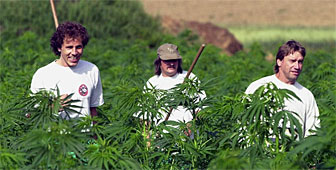Liberalisation plans leave cannabis in legal limbo

Switzerland is preparing to decriminalise the consumption of cannabis, but local authorities and experts abroad remain sceptical about the end result.
The proposed liberalisation is intended to bring the law into line with reality: around half a million people in Switzerland are thought to be regular users of cannabis.
Under the new legislation, possession and production of cannabis for personal use would be allowed, as well as limited trade in the drug. But it would remain illegal to import or export cannabis and advertising would be banned.
Along with the decriminalisation of cannabis, other measures would be introduced, particularly preventive ones. This would fit in with Switzerland’s drug policy, which is based on four criteria: prevention, repression, treatment and harm reduction.
For the time being though, the sale of cannabis remains illegal, and the police are still pursuing dealers. Recently Zurich cantonal police seized 30 kilograms of marijuana and arrested six people.
Repression
“The repression has actually got worse recently,” said Andrea Demarmels, a legal adviser at the Swiss Hemp Coordination. “It may be because local police have decided to act before a new law is introduced.”
But police deny there has been a clamp down. “It’s an impression that people have because on one side there is a planned liberalisation, and on the other the current law still applies,” said Christian Buschan of the Federal Police Office.
Enforcing the law is a cantonal responsibility, and some are more vigorous than others. Official statistics show that French-speaking cantons take a tougher line than those in German- and Italian-speaking regions.
Indeed, German-speaking Basel City is already preparing for the new legislation. The cantonal authorities recently sent a set of guidelines to owners of hemp shops, reminding them that trade would be allowed as long as there were no sales to minors.
Interpreting the law
Local authorities are often in a quandary as to how to interpret the law. In Italian-speaking canton Ticino, for example, hemp farming has become a lucrative business, with all sorts of products, both legal and not so legal, ending up on the market.
Ticino hemp shops do a roaring trade in cannabis cushions, which are sold as fragrant pillows to help insomniacs. More often, though, the contents of the cushions ends up being smoked.
The police tolerate sales, but periodically shops are closed. Cross-border business has been good too, with Italian customers regularly making the trip to Ticino.
The Italian customs services have increased checks at the border, but cannabis users keep on dreaming up new ways of getting their goodies back to Italy. There are even Internet sites that give tips on how to smuggle cannabis over the border.
Smuggling
Cross-border trade is just one reason that the proposed change in Switzerland’s laws has attracted criticism from abroad. The International Narcotics Control Board (INCB), a UN-affiliated agency, said earlier this year that treating cannabis like alcohol and tobacco would be a “historic mistake.”
The agency added that it viewed any change in the law as a move towards the legalisation of cannabis.
“If this is the case, it goes against the 1961 Convention on Narcotic Drugs,” said Herbert Schaepe, the Board’s secretary. “It would not be acceptable since Switzerland’s neighbours don’t seem to be going down the same road.”
He added that the only way Switzerland’s proposed law would be accepted abroad would be to convince neighbouring countries to follow suit. “We could then perhaps consider changing the convention,” Schaepe told swissinfo.
Criminal activities
The agency also fears that a unilateral decriminalisation of soft drugs, would open the door to criminal activities. “If other countries fail to do the same, you can be sure trafficking groups will channel these drugs through Switzerland,” added Schaepe.
Global consumption of soft drugs has been on the increase, according to the INCB. Four European Union countries – Italy, Luxembourg, Portugal and Spain – now have legislation that decriminalises personal cannabis use, while Belgium is considering doing the same.
In Britain, police often turn a blind eye to cannabis consumption, but possession remains an offence. In the Netherlands, “coffee-shops” carry out an open trade in the drug.
France and Sweden do not tolerate the use or sale of drug. However, cannabis consumption seems to have increased to the same extent in “liberal” or “repressive” countries, according to a report by the Swiss Federal Health Office.
swissinfo

In compliance with the JTI standards
More: SWI swissinfo.ch certified by the Journalism Trust Initiative
You can find an overview of ongoing debates with our journalists here. Please join us!
If you want to start a conversation about a topic raised in this article or want to report factual errors, email us at english@swissinfo.ch.